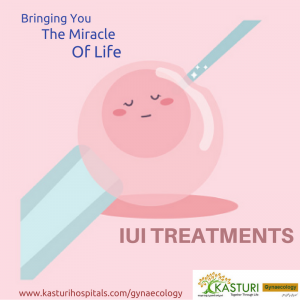Intrauterine insemination also known as IUI is a procedure for treating infertility which involves artificial insemination to facilitate fertilization. The main goal of IUI is to increase the sperm count that reaches the fallopian tubes and thereby increase the chance of fertilization.
In this procedure the sperm that have been washed and concentrated will be placed directly in to the uterus around the time when the ovary releases eggs to be fertilized. The sperm will then swim into the fallopian tube and fertilize with a waiting egg and results in a normal pregnancy, which is the hoped outcome of intrauterine insemination. The IUI treatment can be coordinated with fertility medications or with the normal cycle of the woman, depending on the reasons for infertility.
In this procedure the sperm that have been washed and concentrated will be placed directly in to the uterus around the time when the ovary releases eggs to be fertilized. The sperm will then swim into the fallopian tube and fertilize with a waiting egg and results in a normal pregnancy, which is the hoped outcome of intrauterine insemination. The IUI treatment can be coordinated with fertility medications or with the normal cycle of the woman, depending on the reasons for infertility.
Conditions Treated
IUI treatment helps to boost the chance of pregnancy for the following fertility problems which include:
- Poor Sperm count or sperm motility
- Problems with ovulation
- Unexplained infertility
- Problems with ejaculation or developing an erection
- Cervical scarring or cervical mucus abnormalities
- Semen allergy
- Sexually transmitted disease, such as HIV or hepatitis (in either partner)
The procedure also help a woman to use a donor sperm to conceive a child
How does IUI work?
Each IUI procedure is referred to as a "cycle" which requires ovulation, at least one open fallopian tube, and a semen sample with healthy sperm. The cycle of IUI treatment usually goes like this:
Egg production. The will be stimulated using fertility drug to produce eggs for fertilization, or else the doctor may recommend an "unstimulated," or natural production of eggs, without using any fertility drugs (a women typically release only one egg a month)
Washing the sperm. Once the ovulation occurs, the partner will be asked to produce a sperm sample, which will be "washed" to concentrate the hardiest sperm into a small amount of fluid.
Insemination. Then the inserts the concentrated sperm directly into the uterus through the cervix using a thin, long tube called catheter.
Pregnancy Test:. A pregnancy test will be done two weeks after insemination.
Kasturi Multispecialty Hospital provides the best treatment for infertility in Hyderabad. With the advancement of technology they provide the best treatment for almost every infertility conditions with utmost care and privacy.
How does IUI work?
Each IUI procedure is referred to as a "cycle" which requires ovulation, at least one open fallopian tube, and a semen sample with healthy sperm. The cycle of IUI treatment usually goes like this:
Egg production. The will be stimulated using fertility drug to produce eggs for fertilization, or else the doctor may recommend an "unstimulated," or natural production of eggs, without using any fertility drugs (a women typically release only one egg a month)
Washing the sperm. Once the ovulation occurs, the partner will be asked to produce a sperm sample, which will be "washed" to concentrate the hardiest sperm into a small amount of fluid.
Insemination. Then the inserts the concentrated sperm directly into the uterus through the cervix using a thin, long tube called catheter.
Pregnancy Test:. A pregnancy test will be done two weeks after insemination.
Kasturi Multispecialty Hospital provides the best treatment for infertility in Hyderabad. With the advancement of technology they provide the best treatment for almost every infertility conditions with utmost care and privacy.

